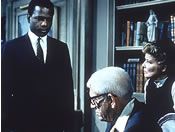
Sidney Poitier, Spencer Tracy and Katharine Hepburn in Guess Who's Coming to Dinner?
It's been said that pornography is the driving force behind any new media. If we expand that definition to include its emotional equivalent, the melodramatic romance, we can see that from the outset cinema has been driven this way.
The love story was a powerful element in early silent films and was one of the crucial elements in making the medium human, something audiences could really relate to as well as be dazzled by. As other genres have come and gone, it has remained constant - something which will always draw viewers in. Yet, evolving over the decades, it has not only reflected the changing times, it has contributed to that change itself.
One of the most popular tropes of the cinematic romance is the story of forbidden love. Often this draws on older themes popular from classic novels - class conflict, for instance, or lovers who find themselves on opposite sides in war - but there's another, more challenging variant which deals with contemporary issues.
In 1957 Caribbean romance Island In The Sun sparked a flurry of protest with Hollywood's first interracial screen kiss (later paralleled on television in Star Trek), though it wasn't until a decade later, in Guess Who's Coming to Dinner?, that cinema-goers saw an interracial romance with a happy ending. Whilst in the former film Harry Belafonte's David agonised over the political consequences of his attraction to Joan Fontaine's glamorous Mavis, representing the concerns of the time, Island sparked debate in America and enabled the development of films which wouldn't previously have been considered.
Today a film such as Monster's Ball can win Oscars, but romances of this type still tend to be central subjects in American cinema and rarely make an incidental appearance. British cinema has developed rather differently, as witnessed by films like Mona Lisa and 28 Days Later.
In 1985 My Beautiful Laundrette pulled out all the stops by presenting a romance which was both interracial and homosexual. Though based on a popular book by Hanif Kureishi, no one expected it to be a success - but it went on to make a big impression on critics and audiences alike, launching the careers of Stephen Frears and Daniel Day-Lewis. At the time, queer cinema was still very much a minority phenomenon in Britain (and even more so in the US); My Beautiful Laundrette was one of the films which helped to break boundaries and reach out to a mainstream audience.
Earlier films about homosexuality, such as the acclaimed Victim, had focused on politics and the civil rights movement, but Frears' production centred on a human story with romance as a key element. It was succeeded in 1992 by The Crying Game, which did the same for a story with a transsexual protagonist, initially shocking audiences but, in doing so, opening up discussion in the popular media which contributed to the greater acceptance of transsexuality in society.
These days we like to think of ourselves as enlightened, and looking back at the days when interracial and gay kisses were shocking and might even make us laugh. But there are, of course, still plenty of taboos in cinema, and sometimes we find them in unexpected places.
After 36 years, Harold And Maude continues to shock and repel viewers despite its gentle storyline and abundance of good humour. Why? Because Harold is 20 years old and Maude is 79. The age difference is particularly remarkable because of their sexes - Hollywood continually presents us with images of older men and younger women, yet it rarely manages anything as affecting as this independent cult favourite. Perhaps that's because the intergenerational romance is something audiences are usually cynical about; it's presumed that the beautiful young starlet really only wants her older lover for his power or money. Films which manage to circumvent this, like 2002's The Quiet American, are few and far between.
If you want something a bit different this Valentine's Day, remember that there are a wealth of love stories out there besides the ones Hollywood usually presents to us. And romance isn't always a throwaway genre - sometimes it might change the way we look at the world.





















